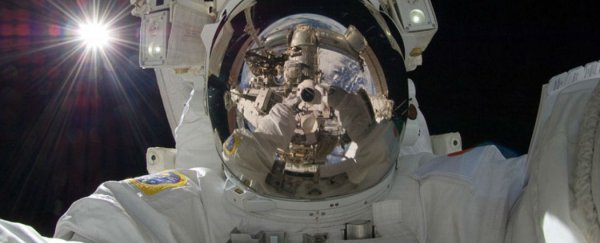NASA plans to send a crewed mission to Mars within the next 20 years, but a recent study indicates that the trip might be more hazardous than previously thought. New data has shown that exposure to cosmic rays could severely impair an astronaut's cognitive functions over the course of a long-duration, deep space mission.
In a laboratory setting, researchers from the University of California, Irvine in the US simulated the harsh conditions of deep space by subjecting a group of mice to blasts of accelerated particles, similar to cosmic rays. The results indicated that the irradiated mice had slower response times, were forgetful, and even confused.
"This is not positive news for astronauts deployed on a two- to three-year round trip to Mars," one of the team Charles Limoli, a professor of radiation oncology, said in a press release. "Performance decrements, memory deficits, and loss of awareness and focus during spaceflight may affect mission-critical activities, and exposure to these particles may have long-term adverse consequences to cognition throughout life."
Cosmic rays - the by-product of galactic explosions such as supernovae - are high-energy charged particles speeding through space. They can penetrate the hull of a spacecraft and human bones with ease, causing significant damage to the body's central nervous system.
On Earth, the magnetosphere acts as a protective bubble, shielding us from the damaging effects of these rays, but the tenuous Martian atmosphere offers no such protection. Our magnetosphere extends 56,000 kilometres (35,000 miles) above Earth's surface, and as such, even the astronauts on board the International Space Station are protected against these harmful rays.
In the study, published in Science Advances and conducted at NASA's Space Radiation Laboratory at the Brookhaven National Laboratory in New York, a group of genetically altered mice were blasted with beams of oxygen and titanium ions accelerated to two-thirds the speed of light - the same type of ions found in galactic cosmic rays. The mice were genetically altered to have glowing fluorescent neurons, making it easier for scientists to study changes in their brains.
Six weeks after exposure, the irradiated mice had 30 to 40 percent fewer dendrites - the branches between neurons that carry electrical signals - than the control group. Exposure to the blasts of cosmic rays triggered the degradation of the dendrites and persisted over time. This loss of dendrites is associated with the mental decline seen patients who suffer from Alzheimer's and similar neurological diseases.
Both groups of mice were then put through a battery of cognitive tests designed to test their learning and memory functions. New objects were placed among familiar objects and the team watched as the irradiated mice became confused more easily and lacked curiosity when compared with the control group. If the same changes were to occur in astronauts while in space, their ability to react quickly or to recall information would be affected.
With Mars missions expected to last between two and three years, any effect from cosmic ray exposure would have ample time to manifest. Astronauts' ability to carry out mission duties, such as multitasking and conducting research experiments, as well as their overall cognitive health, could be compromised. Limoli and his team do not think the level of impairment would be so severe that an astronaut would wreck a spaceship; however, they could easily ruin an experiment.
The brain is a complex system and longer-term studies are required before we understand the full effects of cosmic rays, and can determine if the structural and behavioral changes seen in the mice are permanent.
